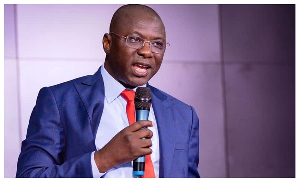Accra, July 18, GNA - African filmmakers should use their productions to liberate the minds of the people of the continent. Mr. Kwaw Ansah, Executive Director of TV Africa, a television station in Accra, said this at the end of the Sixth Major Students Film and Television Festival "ANIWA Africa" 2003, in Accra on Friday. He expressed regret that, instead of using film to restore the African sense of direction, "we are rather using it to compound the very problems of superstition, poverty, disease and other negative practices".
It is incumbent on filmmakers and television producers to reverse the "unacceptable behaviour on our screens" and help in eradicating hunger, poverty and disease from the continent through their works, he added. The festival under the theme: "Liberating the Mind", was to promote and encourage quality training in film and television production in Africa. Over 50 participants from Gambia, Ghana, Nigeria, South Africa, Zimbabwe, Kenya and Germany attended the two-week event, which also focused on the role of film and television as instruments for change in Africa. ANIWA 2003 also provided a forum for trainees to exchange experiences and to get exposed to new ideas and skills.
A total of 46 films including 19 Features, eight Documentaries, two Documentary-drama, five Animations, three Television magazines, three Television drama, three Advertisements and four Musicals were screened for a jury of four, with Mr. Billy Mutta, a veteran documentary film producer, from Kenya as chairman. The films were the works of students and producers who had recently graduated from the countries. The Jury noted with concern that, there was a decline in all areas of film productions in Africa and recommended among others things that, the ANIWA secretariat must ensure all prospective participants received advance copies of the rules and regulations governing the festival.
Mr Martin Loh, Director of the National Film and Television Institute (NAFTI), said it was observed during the festival, that the youth and children had been neglected in the productions and called for attention to be paid to that segment. He advised filmmakers to take African values into consideration and to portray a "more positive way" for the continent. Mr. Loh expressed the hope that the participants would take the lessons they learnt at the festival to their countries and made them reflect in their productions "so that we would stop coping others and be ourselves". He said the first 23 students for the degree programme at the Institute would graduate in March next year at the University of Ghana, Legon. The participants were awarded certificates and plaques for their productions.
Entertainment of Saturday, 19 July 2003
Source: GNA






![NPP Flagbearer, Dr. Mahamudu Bawumia [L] and NDC Flagbearer John Mahama NPP Flagbearer, Dr. Mahamudu Bawumia [L] and NDC Flagbearer John Mahama](https://cdn.ghanaweb.com/imagelib/pics/869/86902869.295.jpg)









